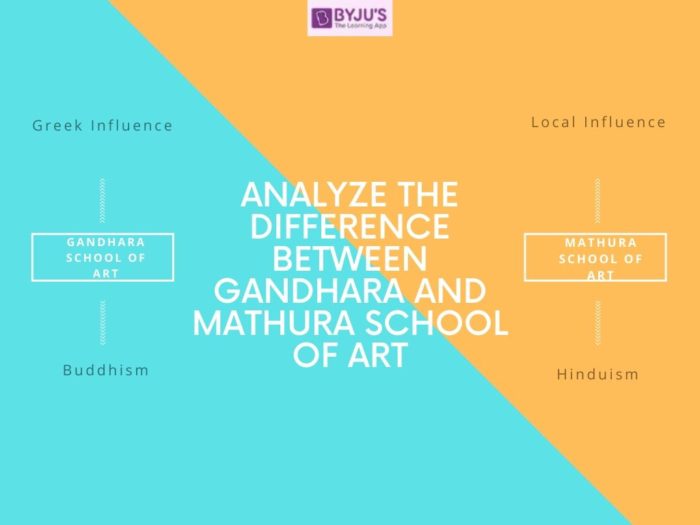Are Mudras From the Mathura Style of Buddhist Art
India has a rich and varied civilisation as characterized in the after art forms of the subcontinent, dating from the 14th through the 19th century. Fine art and culture is an of import topic in the IAS Exam. A substantial number of questions can exist asked from the art and culture segment in UPSC Prelims too every bit Mains examination. Here we are giving the major difference between the Gandhara School of Art and the Mathura school of Art.
The Gandhara School of Art
During the Kushana Empire'southward rule, the Gandhara art prospered in India. In a higher place all, Kanishka, the greatest of the Kushanas was a famous capitalist of fine art and architecture. The Gandhara School of art flourished in his reign. Gandhara School was profoundly influenced by Greek methodologies.
The figures of Buddha were more spiritual and carved mainly in grey and blue-grey color with the finest details.
The Mathura School of Art
The Mathura School of Art was entirely influenced by Indianism. The stone used in the Mathura school of arts was reddish sandstone. The sculptures were less spiritual.
They more often than not used the spotted red sandstone for making sculptures and statues. The initial images of the Buddha and the Bodhisattva are happy and fleshy figures with lilliputian spirituality nigh them. The Mathura School of arts prided themselves on creating images of Buddha and they also made statues of many gods and goddesses such equally Jain Tirthankaras.
To know more than in detail about the Buddha and his Teachings, visit the linked commodity

Difference between Mathura and Gandhara School of Art
Although both the Mathura and Gandhara schools of Fine art share some rudimentary similarities between themselves, there are some fundamental differences between the two: which is highlighted in the table given below:
| Areas of differences | Gandhara School of art | Mathura School of Fine art |
| Reign | Kushana Dynasty | Kushana Dynasty |
| Area | Gandhara (Now located in the Peshawar Valley of Modern-day Pakistan) | Mathura |
| Outside influences | Greek and possibly Macedonian influence |
|
| Religious influence | Buddhism |
|
| Cloth Used | Bluish- Grey sandstone Grey sandstone | Spotted blood-red sandstone |
| Features of Buddha sculptures | Spiritual Buddha Deplorable Buddha Disguised Buddha Less ornamentation Peachy detailing Buddha in Yogi postures Greek factors similar wavy hair, large brow, long ears | Grinning Buddha Less emphasis on spiritual aspects Shaven caput and face Muscular Physique Graceful posture of Buddha Seated in Padmasana Buddha surrounded by two monks: Padmapani (holding Lotus) and Vajrapani( Holding Vajra) Halo around the head of Buddha busy with geometrical motifs The Standing Buddhas of the Sravasti, Sarnath, and Kausambhi |
| Various Mudras of Buddha in Gandhara Art | Abhayamudra- Don't fear Bhumisparshamudra -Touching the globe Dhyana mudra- Meditation Dharmachakramudra- A preaching mudra | — |
Thus learning nearly the diverse schools of art is essential as this is an of import topic that tin be asked in the IAS exam. You can also refer to the post-obit links to prepare for the Art and Culture segment of the exam.
- NCERT Notes for Art and Civilisation for UPSC
- How to Tackle UPSC Art and Culture
- Deviation Between Fine art and Civilisation
Aspirants can notice more Difference Between Articles , past visiting the linked page
Gandhara and Mathura Schoolhouse of Fine art (UPSC Notes):- Download PDF Hither
Frequently Asked Questions nearly Gandhara and Mathura School of Fine art
Who founded Gandhara schoolhouse of art?
The Gandhara School of art had also developed in first century AD forth with Mathura Schoolhouse during reign of Kushana emperor Kanishka. Both Shakas and Kushanas were patrons of Gandhara School, which is known for the first sculptural representations of the Buddha in human form.
What is Mathura schoolhouse of artl?
The Art of Mathura refers to a item school of Indian art, most entirely surviving in the class of sculpture, starting in the 2nd century BCE, which centered on the metropolis of Mathura, in central northern Republic of india, during a period in which Buddhism, Jainism together with Hinduism flourished in Republic of india.
Candidates tin can observe the general pattern of the UPSC Exams by visiting the UPSC Syllabus page. For more manufactures and examination-related preparation materials, refer to the links given in the tabular array below:
Related Links
Source: https://byjus.com/free-ias-prep/difference-between-gandhara-and-mathura-school-art/
0 Response to "Are Mudras From the Mathura Style of Buddhist Art"
Enregistrer un commentaire